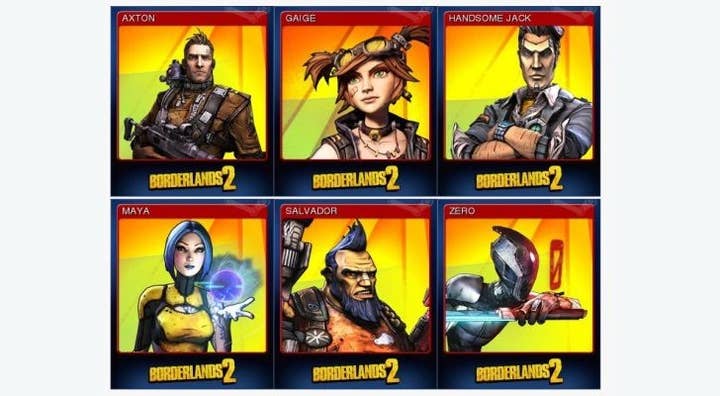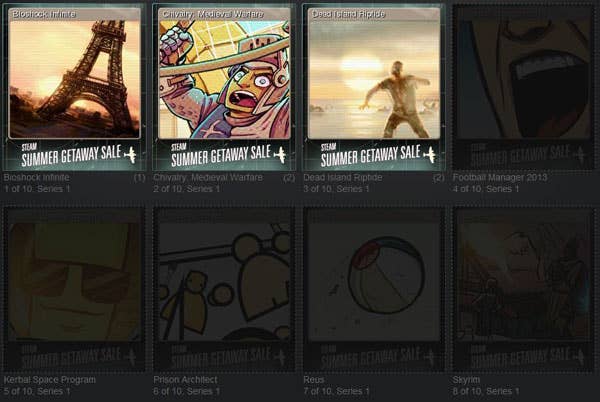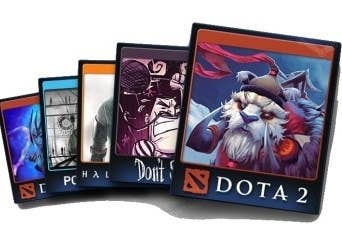The Psychology Behind Steam Trading Cards
How your mind processes a trading card system and the mental tricks at play in Valve's latest addition to its digital marketplace
A few weeks ago the digital distribution juggernaut Steam rolled out a curious new program involving levels for your Steam account, badges, and trading cards - virtual trading cards. If a game supports them, you get free cards from that game's set just for playing it. But you can only get about half the cards in each game's set this way. The remaining cards must be traded for with other players or bought from Steam's Community Marketplace.
"You can't not get the cards. Just showing that you've begun progress towards that goal is enough to create some mental tension over not having yet reached it"
If you don't want to sell or ignore the cards, what do you do with them once they show up? After completing a set, you can perform a little digital origami and craft them into a game badge. Besides sitting in your inventory, these virtual items grant cosmetic features for your Steam account, such as backgrounds or chat icons.
But wait. We're not done. Building badges out of trading cards also earns you experience points for your Steam account. It's like you're turning in a quest. Get enough experience and you level up, which brings rewards like a larger number. You're probably familiar with the concept.
If this all makes you arch one eyebrow and suspect that Steam just might be using some psychological tricks to get you to buy and play more games, you're not alone. There are well understood psychological phenomenon at play, representing disciplines like consumer psychology, behavioral economics, and social psychology. Let's look at some of them.

The first psychological phenomenon that stands out to me has to do with a bias we have towards completing what we start - something often called the endowed progress effect. Once we feel like we've begun progress towards a goal, it nags at our minds and checking it off our list or filling in the final bit of progress to fill up a bar makes us feel good. In one experiment researchers gave car wash customers a card that let them earn a wash if they collected enough stamps. Half the customers got a blank "Buy 8, get 1 free" card. The rest got a "Buy 10, get 1 free" card, but with two complimentary stamps to get them started. Thus, both groups needed to buy 8 to get 1 free. But those who got the "Buy 10, get 1 free" card with the 2 starter stamps tended to come back more often and to wait less time between purchases.
This effect has its roots in research done by Russian psychology Bluma Zeigarnik, who noticed that waiters were easily able to remember orders not yet delivered to tables, but forgot them as soon as the food was put in place. Ever felt hesitant to move on to the next area in a RPG because you have so many side quests unfinished in your current area? Same thing. Further research confirmed this gestalt idea that we easily remember the details around incomplete tasks - indeed, they're sometimes difficult to take our mind off of.
"Valve has created a special, limited set of trading cards for its Summer Sale. Since the sale is the game, you earn these particular cards by spending money"
I can, for example, tell you right now that I am missing the Soldier, Spy, and Engineer cards from Steam's Team Fortress 2 set without looking up anything. Steam kickstarts this quirk of human nature with its trading cards by giving you random cards just for playing a game. You can't not get the cards, so like the car wash customers receiving two free starter stamps you can't not start your progress towards completing the set. And Steam gleefully (or so it seems to me) points out how many cards you have left to earn for every game and alerts you whenever you get a new one. Just showing that you've begun progress towards that goal is enough to create some mental tension over not having yet reached it, and some people will pester their friends or spend a bit of money to buy the missing cards off the Community Marketplace. Valve, of course, wets its beak a little on every sale in the form of a transaction fee.
Valve has also doubled down on this effect during its Summer Sale event by creating a special, limited time set of trading cards themed around the sale. But since the sale is the game, you earn these particular cards by spending money. For every $10 you spend, you get a card.
Steam even provides a helpful progress bar showing how much more you have to spend to complete the quest it has imposed upon you. Again, just feeling like you've begun work towards this goal is more likely to make you come back more often and buy more games if it releases the mental tension.

But what if you don't want to complete sets and craft badges? What if you want to drop a little spare change into your Steam Wallet by selling your complimentary cards on the Community Marketplace? Sorry, there's a psychological trick at play there, too.
Once you sell a card (or any other item) on Steam's Community Markeplace, Steam takes a cut, then puts the balance in your Steam Wallet. Those funds can be put towards anything Steam sells, but once they're in our Steam Wallets, we tend to think of that money differently. We form what psychologists call a "mental account." It's like any account in any budget, but because it's only held in our minds the use of that account is subject to all kinds of biases and irrational thinking. We have, for example, a difficult time thinking about using that money outside the context it was created in - in this case, the Steam trading cards or the Community Marketplace in general. So we're more likely to use it for that purpose than any other.
On top of that, the old saying "easy come, easy go" is very much a real thing. If we experience no pain associated with a gain, we are less likely to feel pain letting go of that money. That means we're more likely to think of the money as "already spent" and use it on trading cards, cosmetic items for DOTA2, or any other marketplace item that we might not have typed in our credit cards to buy. The exact same mental foible happens with buying dumb stuff in the real world just because you got store credit, or thinking that the money you've won on a lucky night out gambling can be blown on an expensive hotel room upgrade without regrets. That money is already spent, and the feeling of loss has already occurred. So it's easier to let go.
"Money in Steam Wallets is thought of differently - a mental account. Because it's held in our minds, the use of that account is subject to all kinds of biases and irrational thinking"
And you know what? Once you take that step of selling off your freebie trading cards in the Marketplace, you're in the ecosystem. Even if you think the cards are stupid, you've crossed the line from "I don't use the Marketplace" to the other side. And consistency matters to humans.
We feel mental inertia to keep our thoughts in line with our behaviors, and if one changes we'll often nudge the other so that they match. This means that faced with the fact that you're a Marketplace user (even just that once), you're more likely to change your attitude about how dumb the whole thing is.
So there you have it. I'm playing around with the Steam trading cards myself and have made a few Marketplace transactions to see what it's all about. In some ways it's fun. I've completed some sets and got some dumb little trinkets. And if you want to do that, go for it. Play the market, craft your badges, get some glee out of finding that rare foil card and the emoticon that's selling well in the marketplace. But arming yourself with knowledge about how your mind processes the trading card system will let you dictate your own terms.
Jamie Madigan writes about the overlap between psychology and videogames at www.psychologyofgames.com. Follow him on Twitter: @JamieMadigan
